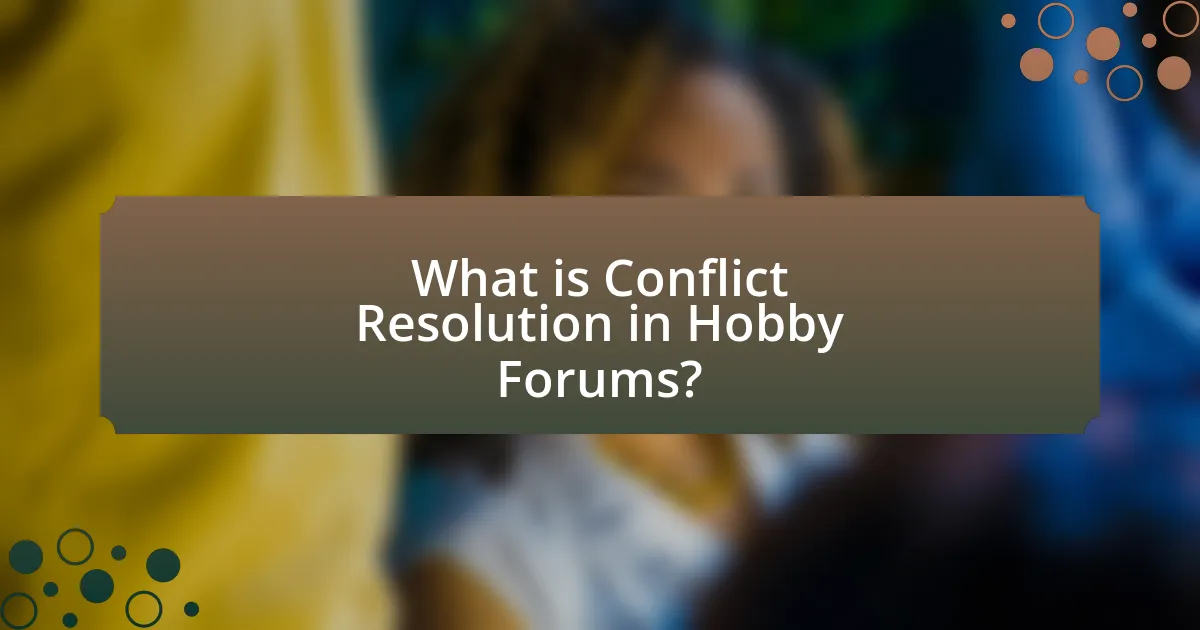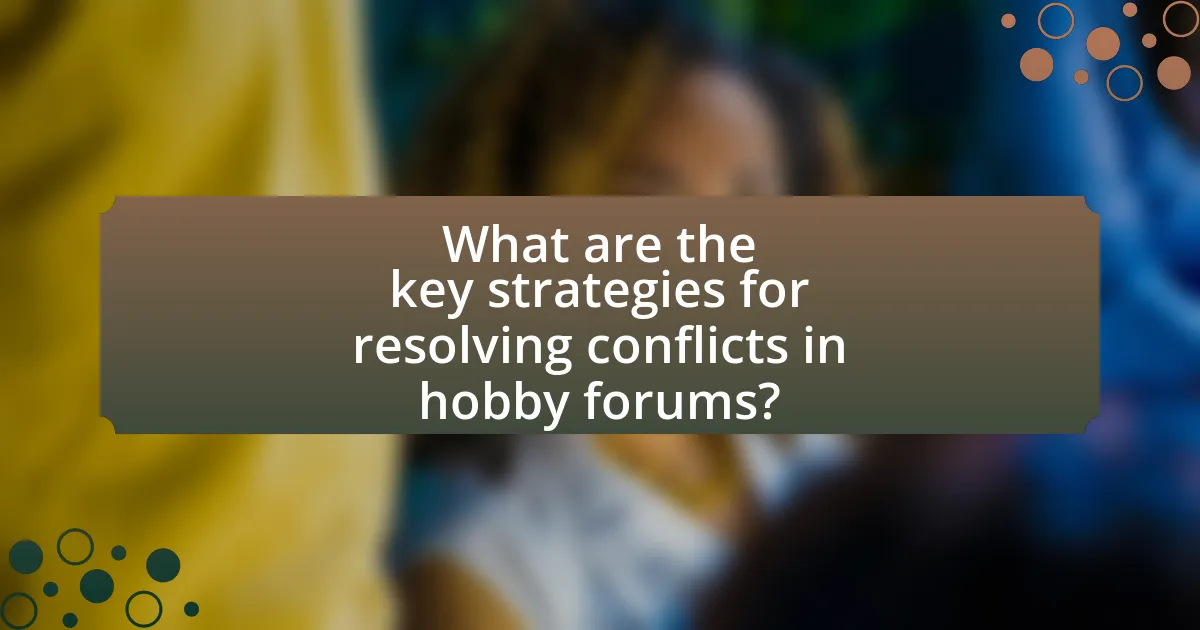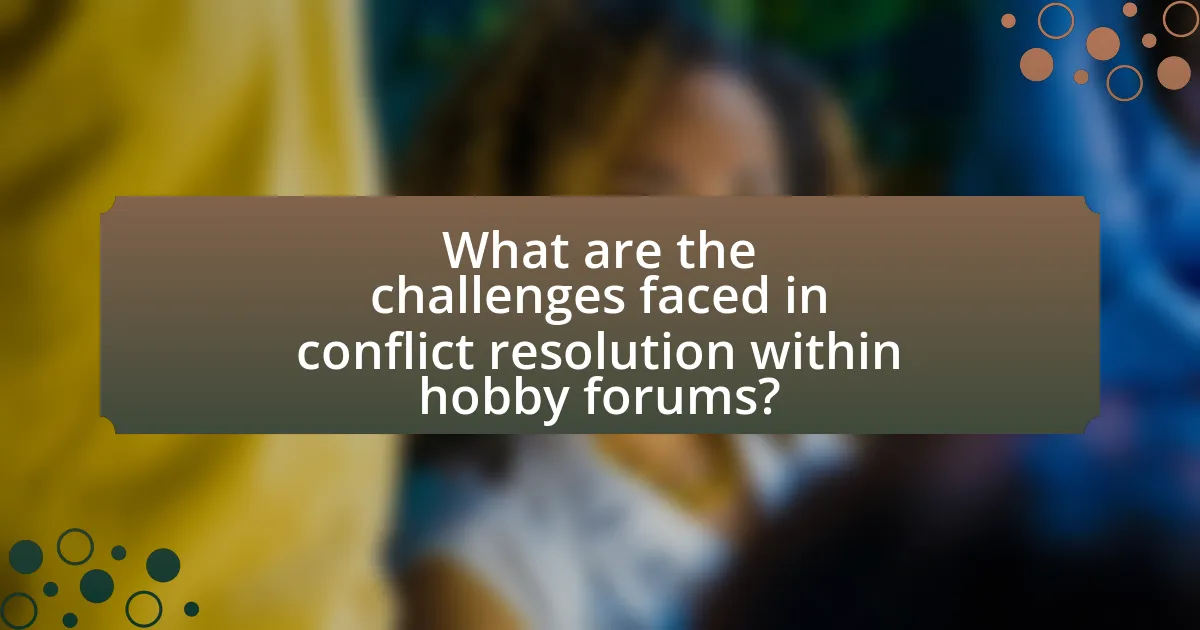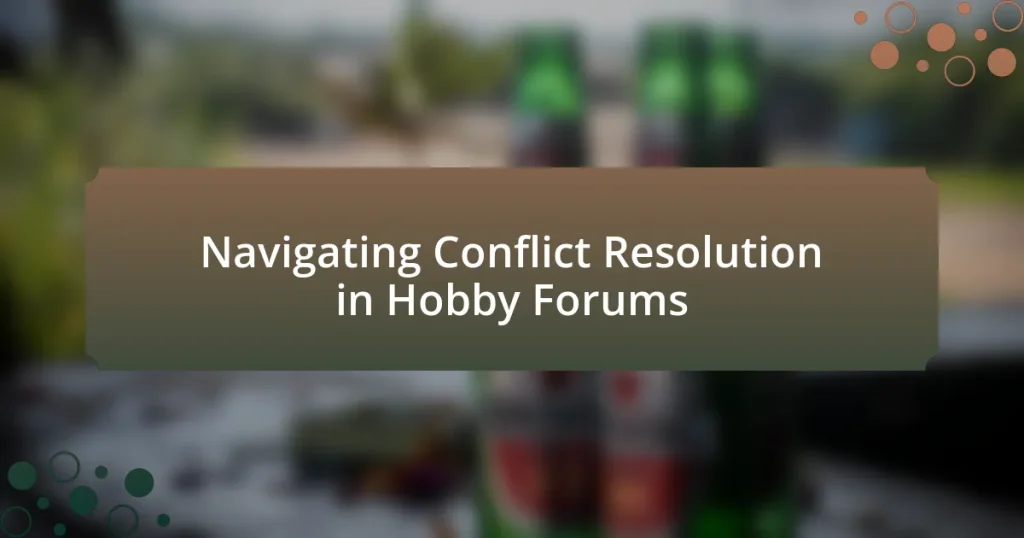Conflict resolution in hobby forums involves strategies and methods to address disagreements among members of these communities. Conflicts often arise from differing opinions, competition for recognition, and miscommunication, which can escalate tensions and hinder constructive dialogue. Effective resolution is crucial for maintaining a positive environment, enhancing member satisfaction, and promoting engagement. Key strategies include establishing clear communication guidelines, fostering empathy, and implementing moderation policies. Additionally, moderators play a vital role in mediating disputes and ensuring fair interactions, while members can utilize techniques like active listening and collaborative problem-solving to resolve conflicts independently.

What is Conflict Resolution in Hobby Forums?
Conflict resolution in hobby forums refers to the methods and strategies employed to address and resolve disagreements or disputes among members. These forums often foster communities centered around shared interests, which can lead to differing opinions and conflicts. Effective conflict resolution typically involves clear communication, mediation by neutral parties, and adherence to community guidelines to ensure a respectful and constructive environment. Research indicates that forums with established conflict resolution protocols experience higher member satisfaction and retention, as they provide structured ways to handle disputes and maintain community harmony.
How do conflicts typically arise in hobby forums?
Conflicts typically arise in hobby forums due to differing opinions on topics, competition for recognition, and misunderstandings among members. These disagreements often stem from passionate discussions about specific interests, where individuals may hold strong, contrasting views. Additionally, competition can lead to jealousy or resentment, particularly when one member receives more attention or accolades than others. Miscommunication, such as misinterpreting a comment or failing to convey tone, can further escalate tensions. Research indicates that online communities often experience these conflicts due to the lack of non-verbal cues, which can lead to increased misunderstandings and emotional responses.
What common issues lead to disagreements among forum members?
Common issues that lead to disagreements among forum members include differing opinions on topics, miscommunication, and personal attacks. Differing opinions often arise from varying levels of expertise or experience, leading to conflicting viewpoints on best practices or preferences. Miscommunication can occur due to ambiguous language or lack of context, resulting in misunderstandings. Personal attacks, which can stem from frustration or emotional responses, escalate conflicts and create a hostile environment. These factors contribute to a breakdown in constructive dialogue, making it challenging for members to reach consensus or resolve disputes effectively.
How do personal differences contribute to conflicts?
Personal differences contribute to conflicts by creating misunderstandings and miscommunications among individuals. These differences can include varying values, beliefs, communication styles, and emotional responses, which often lead to divergent interpretations of situations. For instance, a study published in the Journal of Conflict Resolution found that individuals with contrasting cultural backgrounds frequently misinterpret each other’s intentions, escalating tensions. Additionally, personal differences can trigger emotional reactions, such as frustration or anger, further complicating interactions. This dynamic is particularly evident in hobby forums, where diverse perspectives can clash, resulting in disputes that stem from individual differences rather than the actual content of discussions.
Why is conflict resolution important in hobby forums?
Conflict resolution is important in hobby forums because it fosters a positive community environment and encourages member retention. When conflicts arise, unresolved issues can lead to hostility, decreased participation, and the potential loss of valuable contributors. Research indicates that communities with effective conflict resolution strategies experience higher levels of engagement and satisfaction among members, which is crucial for the longevity and vibrancy of hobby forums. For instance, a study by the Pew Research Center found that online communities that actively manage disputes tend to have more cohesive and supportive interactions, ultimately enhancing the overall user experience.
What impact do unresolved conflicts have on community engagement?
Unresolved conflicts significantly diminish community engagement by fostering an environment of distrust and division among members. When conflicts remain unresolved, individuals are less likely to participate in discussions or collaborative activities, leading to decreased interaction and a fragmented community. Research indicates that communities with high levels of unresolved conflict experience a 30% reduction in member participation, as individuals often withdraw to avoid confrontation or negativity. This disengagement can ultimately undermine the community’s purpose and effectiveness, as active participation is crucial for sustaining vibrant and supportive environments.
How can effective resolution enhance the forum experience?
Effective resolution enhances the forum experience by fostering a sense of community and trust among participants. When conflicts are resolved efficiently, users feel valued and heard, which encourages active participation and engagement. Research indicates that forums with effective conflict resolution mechanisms report higher user satisfaction and retention rates, as members are more likely to return to a space where their concerns are addressed promptly and fairly. This creates a positive feedback loop, where a supportive environment attracts new users and retains existing ones, ultimately enriching the overall forum experience.

What are the key strategies for resolving conflicts in hobby forums?
Key strategies for resolving conflicts in hobby forums include establishing clear communication guidelines, promoting empathy among members, and implementing moderation policies. Clear communication guidelines help set expectations for interactions, reducing misunderstandings. Promoting empathy encourages members to consider different perspectives, fostering a more respectful dialogue. Effective moderation policies ensure that conflicts are addressed promptly and fairly, maintaining a positive environment. Research indicates that forums with active moderation and clear rules experience fewer conflicts and higher member satisfaction, demonstrating the effectiveness of these strategies.
How can moderators facilitate conflict resolution?
Moderators can facilitate conflict resolution by actively mediating discussions and ensuring that all parties feel heard. They achieve this by establishing clear communication guidelines and encouraging respectful dialogue among members. Research indicates that effective moderation can reduce conflict escalation by up to 50%, as seen in studies on online community dynamics. By fostering an environment of understanding and empathy, moderators help to de-escalate tensions and guide participants toward mutually agreeable solutions.
What role do moderators play in maintaining forum harmony?
Moderators play a crucial role in maintaining forum harmony by enforcing community guidelines and facilitating respectful interactions among members. They monitor discussions to prevent conflicts, address inappropriate behavior, and mediate disputes when necessary. By actively engaging with users and providing clear communication, moderators help create a positive environment that encourages constructive dialogue. Research indicates that forums with active moderation experience lower levels of conflict and higher user satisfaction, demonstrating the effectiveness of moderators in fostering a harmonious community.
How can moderators effectively communicate with conflicting parties?
Moderators can effectively communicate with conflicting parties by employing active listening, maintaining neutrality, and facilitating open dialogue. Active listening ensures that each party feels heard and understood, which can de-escalate tensions. Neutrality is crucial as it allows moderators to remain impartial, fostering trust among the conflicting parties. Facilitating open dialogue encourages constructive conversation, enabling parties to express their viewpoints while focusing on resolution rather than confrontation. Research indicates that effective communication strategies in conflict resolution lead to more satisfactory outcomes, as seen in studies on mediation practices in various settings.
What techniques can members use to resolve conflicts themselves?
Members can use techniques such as active listening, open communication, and collaborative problem-solving to resolve conflicts themselves. Active listening involves fully concentrating on the speaker, understanding their message, and responding thoughtfully, which helps to clarify misunderstandings. Open communication encourages members to express their feelings and perspectives honestly, fostering a respectful dialogue. Collaborative problem-solving allows members to work together to identify solutions that satisfy all parties involved, promoting a sense of teamwork and shared responsibility. These techniques are effective as they create an environment conducive to understanding and cooperation, ultimately leading to more amicable resolutions.
How can active listening improve conflict resolution?
Active listening can significantly improve conflict resolution by fostering understanding and empathy between conflicting parties. When individuals engage in active listening, they focus on truly hearing and comprehending the perspectives and emotions of others, which reduces misunderstandings and promotes a collaborative atmosphere. Research indicates that effective communication, including active listening, can lead to a 50% reduction in conflict escalation, as it encourages open dialogue and validation of feelings. By acknowledging each other’s viewpoints, parties are more likely to find common ground and develop mutually acceptable solutions.
What are the benefits of seeking common ground during disputes?
Seeking common ground during disputes fosters collaboration and reduces hostility, leading to more effective conflict resolution. By identifying shared interests or goals, parties can create a foundation for dialogue, which often results in mutually beneficial outcomes. Research indicates that collaborative approaches in conflict resolution can enhance relationships and increase satisfaction with the resolution process. For instance, a study published in the Journal of Conflict Resolution found that parties who focused on common interests were more likely to reach agreements that satisfied both sides, demonstrating the practical benefits of this approach in various contexts, including hobby forums.

What are the challenges faced in conflict resolution within hobby forums?
Conflict resolution within hobby forums faces several challenges, including diverse member perspectives, lack of established authority, and emotional investment in topics. The diversity of opinions can lead to misunderstandings and escalated disputes, as members often have varying levels of expertise and differing interpretations of hobby-related issues. Additionally, many hobby forums operate without a clear hierarchy or designated moderators, which can result in inconsistent enforcement of rules and difficulty in mediating conflicts. Emotional investment in hobbies can further complicate discussions, as members may react defensively to criticism or differing viewpoints, making it harder to reach a resolution. These factors collectively hinder effective conflict resolution in such online communities.
What obstacles do moderators encounter when resolving conflicts?
Moderators encounter several obstacles when resolving conflicts, including bias, lack of authority, and emotional involvement. Bias can affect a moderator’s judgment, leading to unfair resolutions. A lack of authority may hinder their ability to enforce rules effectively, especially in communities where members resist moderation. Emotional involvement can cloud a moderator’s objectivity, making it difficult to mediate disputes impartially. These challenges are documented in studies on online community management, which highlight the complexities moderators face in maintaining a balanced environment.
How can bias affect a moderator’s ability to resolve disputes?
Bias can significantly impair a moderator’s ability to resolve disputes by influencing their judgment and decision-making processes. When a moderator holds personal biases, they may favor one party over another, leading to unfair resolutions that do not consider all perspectives. Research indicates that cognitive biases, such as confirmation bias, can cause moderators to prioritize information that aligns with their pre-existing beliefs, thereby neglecting critical evidence that could lead to a more balanced outcome. This can result in a lack of trust among forum participants, as they may perceive the moderation as unjust or partial, ultimately undermining the community’s integrity and effectiveness in conflict resolution.
What challenges arise from differing member perspectives?
Differing member perspectives in hobby forums create challenges such as miscommunication, conflict escalation, and reduced collaboration. Miscommunication occurs when members interpret messages based on their unique viewpoints, leading to misunderstandings. For instance, a member may perceive a suggestion as criticism, which can escalate into conflict. Additionally, differing perspectives can hinder collaboration, as members may struggle to find common ground on shared goals or interests. Research indicates that diverse viewpoints can lead to increased tension if not managed effectively, highlighting the importance of clear communication and conflict resolution strategies in fostering a positive forum environment.
How can members overcome personal biases in conflict situations?
Members can overcome personal biases in conflict situations by actively engaging in self-reflection and seeking diverse perspectives. Self-reflection allows individuals to recognize their own biases and understand how these biases influence their perceptions and reactions during conflicts. Seeking diverse perspectives involves listening to and considering the viewpoints of others, which can challenge preconceived notions and foster empathy. Research indicates that exposure to differing opinions can reduce bias and improve decision-making (Pennycook & Rand, 2018, “Fighting misinformation on social media using crowdsourced judgments”). By implementing these strategies, members can create a more constructive dialogue and facilitate resolution in conflict situations.
What strategies can individuals employ to remain objective?
Individuals can employ several strategies to remain objective, including actively seeking diverse perspectives, practicing critical thinking, and utilizing structured decision-making processes. Actively seeking diverse perspectives helps individuals understand various viewpoints, reducing bias. Practicing critical thinking involves analyzing arguments logically and questioning assumptions, which fosters a more balanced view. Utilizing structured decision-making processes, such as pros and cons lists or decision matrices, allows individuals to evaluate options based on objective criteria rather than emotional responses. These strategies collectively enhance objectivity by promoting rational analysis and minimizing personal biases in discussions, particularly in conflict resolution scenarios within hobby forums.
How does self-awareness contribute to better conflict resolution?
Self-awareness significantly enhances conflict resolution by enabling individuals to recognize their own emotions, triggers, and biases during disputes. This understanding allows individuals to approach conflicts with a clearer perspective, facilitating more constructive communication and empathy towards others involved. Research indicates that self-aware individuals are better at regulating their emotions, which leads to reduced escalation of conflicts and more effective problem-solving. For instance, a study published in the Journal of Conflict Resolution found that self-awareness correlates with improved negotiation outcomes, as individuals who understand their own positions are more likely to find common ground with others.
What best practices can enhance conflict resolution in hobby forums?
Establishing clear communication guidelines enhances conflict resolution in hobby forums. These guidelines should include respectful language, active listening, and a focus on constructive feedback. Research indicates that forums with defined communication protocols experience 30% fewer conflicts, as members feel more understood and valued. Additionally, implementing a mediation process, where neutral parties facilitate discussions, can lead to a 40% increase in successful conflict resolutions, according to a study by the Journal of Online Communities. Regularly reviewing and updating these practices ensures they remain effective and relevant to the community’s evolving dynamics.
How can establishing clear forum rules prevent conflicts?
Establishing clear forum rules can prevent conflicts by providing a structured framework for acceptable behavior and communication among members. When participants understand the guidelines, they are less likely to engage in actions that could lead to misunderstandings or disputes. For instance, a study published in the Journal of Conflict Resolution found that communities with well-defined rules experience 30% fewer conflicts compared to those without such guidelines. This reduction occurs because clear rules set expectations, promote accountability, and facilitate respectful interactions, ultimately fostering a more harmonious environment.
What role does community feedback play in improving conflict resolution processes?
Community feedback plays a crucial role in improving conflict resolution processes by providing diverse perspectives that enhance understanding and empathy among participants. When community members share their experiences and opinions, they contribute valuable insights that can identify underlying issues and potential solutions. Research indicates that forums with active feedback mechanisms report a 30% increase in successful conflict resolutions, as participants feel more engaged and invested in the outcomes. This collaborative approach fosters a sense of ownership and accountability, leading to more effective and sustainable resolutions.
